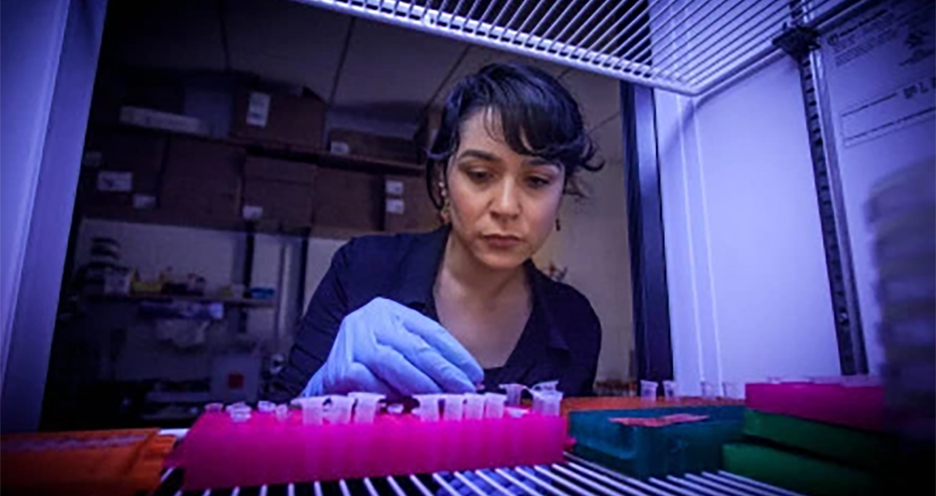If you ask Dr. Betul Kacar, humanity is on the verge of developing the tools to detect life on distant planets remotely. As an astrobiologist who studies the origins of life (on Earth), she is on a quest to broaden and deepen our understanding of “life” in order to give humanity a better chance of successfully finding extraterrestrial organisms.
 With Kacar’s arrival at Life Sciences South on November 1, the Molecular and Cellular Biology Department’s newest faculty member is expanding both the department’s research focus, and its horizons, to the stars.
With Kacar’s arrival at Life Sciences South on November 1, the Molecular and Cellular Biology Department’s newest faculty member is expanding both the department’s research focus, and its horizons, to the stars.
“The University of Arizona is catching the wave at the right time,” Kacar enthuses as she explains her research. “We combine a lot of different tools from different fields to study ancient life that developed on our planet through two records of the past—geology and biology. We reconstruct ancient sequences of proteins to construct an understanding of ancient life on Earth.”
Kacar, whose excitement for her subject is infectious, works at the intersection of biology and astronomy and has a cross-appointment in UA’s Astronomy Department.
“We are in the future right now,” explains Kacar. “We have so much information about other planets. We are looking at questions like ‘How pervasive are conditions for life’s origins?’ and ‘How does life alter the detectable surfaces and volumes of exoplanets?’”
While our search is based on what we, as earthlings, know as life, Kacar stresses the importance of recognizing that life on our own planet also went through changes.
“Our planet’s past resembles an altogether alien planet. For instance, two billion years ago, we humans couldn’t have survived on Earth,” she points out. “We work with DNA, proteins, and whole cells to understand Earth’s history, especially assessing the possible environmental impacts of ancient enzymes on global-scale signatures that record biological activity.”
Some of these enzymes may have changed the planetary environment. In reconstructing key enzymatic intermediates through molecular evolution, biochemistry and genomics, Kacar beams, “you can travel through time!” Time travelling to an ancient Earth may give researchers insights into finding signs of life that arose elsewhere.
Kacar brings to the University of Arizona the opportunity for students to join her on this exciting mission. She will have a couple of rotational students in her lab this year and an undergraduate from the Astronomy department, and she hopes incoming graduate students interested in her work will choose to major in MCB. Kacar is particularly impressed with the diversity of the student body at UA, what the university stands for, and the types of students UA attracts. She hopes to use astrobiology to “connect students to the community, and the community to the stars.”
Interest in astrobiology is growing. On September 28, Kacar spoke at the Library of Congress at a NASA symposium dedicated to astrobiology, evolution and synthetic biology. Watch the video to learn more about this exciting field. Kacar also sits on a steering committee for a new National Science Foundation (NSF) research coordination network directed by the Santa Fe Institute and serves as one of the Principal Investigators for two recently funded, multi-institution grants out of the NSF/NASA Ideas Lab.
Coming to Tucson from Boston, Kacar was a NASA Postdoctoral Fellow and a Research Associate at Harvard University Department of Organismic and Evolutionary Biology. She is also an Associate Professor of the Earth-Life Science Institute at Tokyo Institute of Technology, a new institute dedicated to unlocking the origins of life.
Kacar’s collaborations extend from NASA to family life—her husband, Zach Adam, will join the Lunar & Planetary Laboratory as an Associate Staff Scientist in August 2018. They hope to team teach an astrobiology course that combines geology field work with biology bench work. In their free time, Kacar and Adam are looking forward to enjoying Tucson’s famous sunsets and outdoor life.
While her research has her looking to the stars in the sky, Kacar also “starred” as a TV and movie extra (including in the series 24), while working on her PhD at Emory Medical School. “Atlanta had an up-and-coming movie scene. They were looking for extras, and I was looking for pocket money,” she smiles. But she prefers the stars in her day job.
“When we discover life elsewhere, everyone will want to be an astrobiologist!” Kacar predicts. And, with her arrival, MCB will be well positioned to expand the field.
MCB Heads to the Stars with Astrobiologist Dr. Betul Kacar
Publish Date:
Nov 15, 2017





